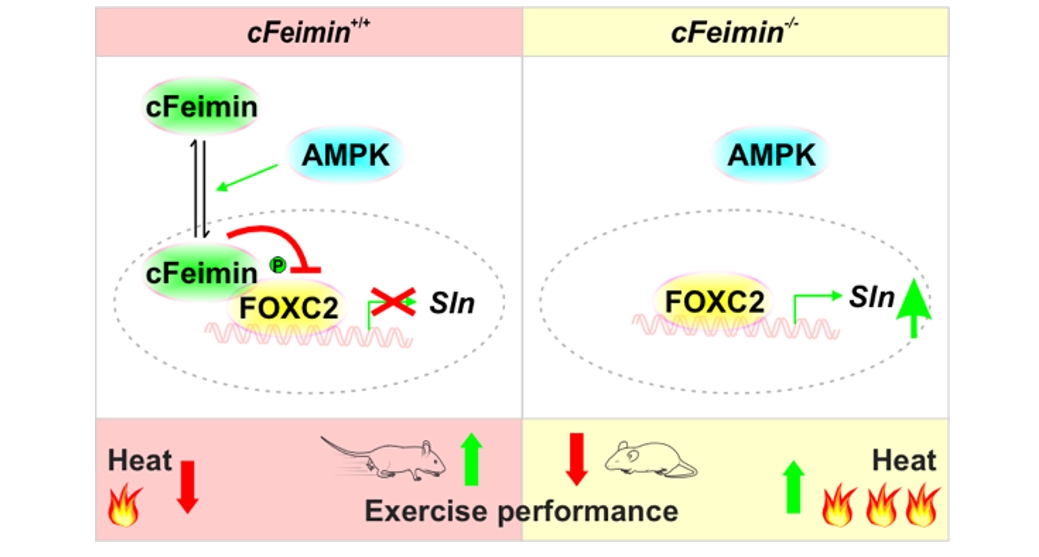Restrictive diets and regular exercise are cornerstone strategies for improving metabolic health and addressing chronic metabolic disorders such as obesity, type 2 diabetes, and sarcopenia. Despite their well-documented benefits, the shared molecular pathways underlying these interventions remain elusive.
On January 2, 2025, Professor Yiguo Wang’s laboratory at the School of Life Sciences, Tsinghua University, published a paper in Nature Metabolism titled “Cellular Feimin enhances exercise performance by suppressing muscle thermogenesis.” This study unveils a crucial mechanism involving Feimin, a muscle-secreted hormone, in regulating exercise performance and thermogenesis.
In a parallel study, the group first identified Feimin as a diet-induced myokine critical for maintaining glucose homeostasis. In this new study, muscle-specific Feimin knockout (Feimin MKO) mice displayed reduced exercise capacity, elevated energy expenditure, and a significant increase in body temperature during exercise. RNA-seq profiling revealed a marked upregulation of Sarcolipin (Sln)—a protein associated with thermogenesis and endurance—in Feimin MKO mice. By silencing Sln through shRNA injections, the team reversed the phenotypic effects of Feimin deficiency, confirming that Feimin regulates thermogenesis and exercise performance through Sln.
Further investigations revealed that exercise stimulates cellular Feimin (cFeimin) translocation from the cytoplasm to the nucleus. Proteomic analyses identified cFeimin's interaction with FOXC2, a transcription factor implicated in energy regulation. Immunoprecipitation confirmed their binding, while studies in Foxc2 knockout mice demonstrated that FOXC2 is essential for Feimin-mediated regulation of Sln expression, thermogenesis, and exercise performance.

Figure 1: Illustration of the AMPK-cFeimin-FOXC2-SLN axis in muscle thermogenesis and exercise performance.
Additionally, the study highlights the role of AMPK in driving cFeimin's nuclear translocation. Pharmacological inhibition of AMPK significantly reduced cFeimin nuclear localization, while phosphorylation analysis pinpointed AMPK-mediated modifications at T112 and T128 on Feimin. Mutation studies and experiments in AMPKα1/2 knockout mice further validated the AMPK-cFeimin-FOXC2-SLN signaling axis as a key regulatory pathway for muscle thermogenesis and exercise adaptation.
Integrated findings from the diet and exercise studies reveal Feimin’s dual role:
• Postprandial glucose regulation: Feimin secretion enhances blood glucose homeostasis.
• Exercise performance: cFeimin nuclear translocation modulates muscle thermogenesis and endurance.
These results provide a molecular framework connecting two essential lifestyle interventions—diet and exercise—and offer new insights into metabolic regulation.
Acknowledgments
Associate Professor Yiguo Wang is the corresponding author. Postdoctoral fellow Ying Peng and Dr. Liangjie Jia are the first authors. Additional contributors include Dr. Xiao Hu, postdoctoral fellow Xiaoliu Shi, PhD candidate Xinlei Fang, professors Yifu Qiu (Peking University) and Zhenji Gan (Nanjing University). Special thanks to professors Haiteng Deng and Sheng-Cai Lin for their invaluable support and advice. This research was supported by the Ministry of Science and Technology, the National Natural Science Foundation of China, the Dushi Program and Pillars of the Nation Funding at Tsinghua University, as well as the Tsinghua-Peking Joint Center for Life Sciences.
Editor: Li Han

